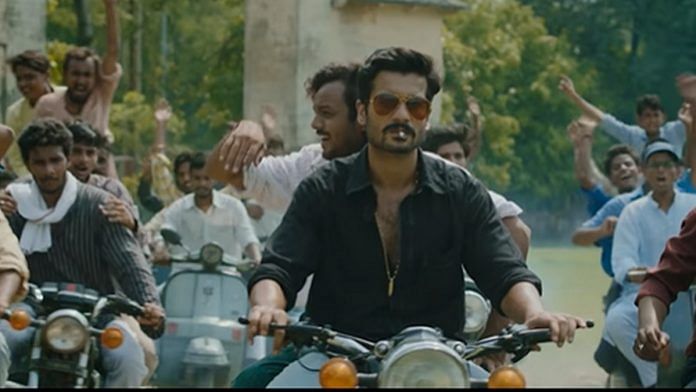Looking at issues from a majoritarian point of view is the new hit formula in Bollywood. After The Kashmir Files, it is Hurdang. But Hurdang fails to even do that successfully.
Set in the 1990s Allahabad, the story revolves around Daddu Thakur, played by Sunny Kaushal, an upper caste, Allahabad University student who wants to become an IAS so that he can marry the love of his life Jhulan, played by Nushrratt Bharucha — a Yadav girl who is also appearing for competitive exams. Fighting the family pressure to get married to a civil servant, Jhulan keeps running away from home to be with Daddu in his boy’s hostel. As a self-proclaimed student leader on campus, Daddu frequently picks fights. He is a typical entitled UP boy — a passionate lover who keeps a gun by him all the time and indulges in ‘gundagardi’ — often witnessed in the bylanes of BHU, Allahabad or many other universities in north Indian states.
The film also has Vijay Varma playing the character of Loha Singh, another student leader and Daddu’s mentor whose favourite pastime is to leak question papers and make some quick buck. He promises Daddu he will get him the UPSC exam paper.
Director Nikhil Nagesh Bhatt introduces the era of the Mandal Commission and the student protests at the time of it. Daddu takes charge of mobilising students after Loha Singh incites him, preying on the former’s fears that he wouldn’t clear IAS if the commission’s reforms are implemented, and thus to agitate is the only way forward.
Also read: You come for Fantastic Beasts 3 but stay for Hogwarts — it’s only for Potterheads
A wannabe politically correct film
Hurdang tries hard to not be anti-caste, but ends up being exactly that. When students begin their protests, Daddu says the agitation won’t target the backward classes but the film, at its heart, comes across anti caste-based reservations.
It tries to look at the Mandal Commission and caste-based reservation through an upper-caste lens, but offers lazy arguments — ‘why not economic status-based reservation’ or ‘education should be free for all’. Towards the second half, the agitation in the film turns into a cause for supporting free education for all. The film’s script doesn’t look convincing and comes out weak in doing justice to a controversial topic.
In an interview, Bhatt had said, “this entire era of the Mandal Commission protests was such an important era but nobody in our country talks about”. Bhatt had the opportunity of representing it on screen in a non-partisan manner, but he failed to do so.
The small-town references, and the dialect and language of the characters give you a peek into the world of UP student politics of the 1990s, but is not enough to keep the viewers interested. Many recent films that explore the small-town plot have done a better job.
Sunny Kaushal tries to do justice to his character but a tighter script would have helped. Kaushal’s character is a confused angry young man with no mind of his own. One can get perplexed whether to like him or hate him. Nushrratt Bharucha looks convincing as a small-town girl, but is very close to her character in Chhalaang. Vijay Varma has the ability to hold the audience together, but the film wastes with this script. Interestingly, the actor has not done any promotion of the film recently on his Instagram.
Hurdang ends with a monologue, which reiterates how students don’t need reservations, but education. It also says that socially backward people need caste-based reservation, but for that, nobody needs to suffer, hinting at the immolation attempts made by students during the anti-reservation protests in the 1990s.
Director Nikhil Nagesh Bhatt’s film has almost close to no Dalit or backward caste representation. Even the inter-caste love story of Daddu and Jhulan is an opportunity missed when it comes to exploring the social and caste dynamics. It is ironic how Sunny’s elder brother Vicky Kaushal did a brilliant Neeraj Ghaywan film, which was also a love-story at its heart, but explored the issues and stigma attached to the lower caste. Vicky Kaushal, while promoting his brother’s movie, should have just once recalled his role in Masaan.



